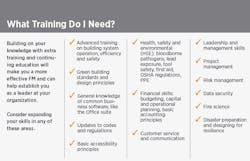An FM has to be a jack of all trades, changing out lamps one minute and planning a comprehensive energy efficiency initiative the next. But how well-rounded is that knowledge? If you’re feeling like a master of none, it might be time to hit the books. Fine-tune your skill set and make sure your staff is up to speed with these tips from FM firms.
What You Really Need on Your Resume
Obviously, technical knowledge of building systems is key for any FM, but Andrew Foote, Vice President of Learning and Development at CBRE, a commercial real estate company that also offers FM services, notes that customer service skills are just as important – perhaps more so. Whether you’re servicing tenants or part of the staff in an owner-occupied building, keeping building occupants happy and responding to their concerns is a skill that can’t always be taught.
“Know what makes your client tick. If you understand your client, you really start to think about the work that you do as part of a business and how you fit in, and it helps your job become more relevant. Understand how what you do translates to bigger outcomes.”
Andrew Foote,
Vice President of Learning and
Development at CBRE
“We look for a people person who likes to interact with people,” adds Brian Harnetiaux, Immediate Former Chair of BOMA International and Head of Asset Management for McCarthy, Cook & Co., a real estate investment and development company that also manages buildings. “We refer to our property managers as the mayors of their asset. We want it to be their business and for them to run buildings the way they want to run them. They need to be multitaskers and customer service concierges and to run the operations. In today’s world, so much more is expected of them, so our No. 1 thing we look for is people who work with people.”
Facilities management is increasingly becoming a key part of business strategy, so FMs need to take that into consideration when vying for a new position or taking a stronger leadership role, explains Maureen Ehrenberg, President of Global Integrated Facilities Management for JLL, a commercial real estate services firm that offers facilities management.
“When we’re looking for an FM, we’re typically looking for great leadership skills, strategy around the business and FM provision, an understanding of the connection between hard services and soft services, and really strong collaborative skills,” Ehrenberg says.
Skills That Set You Apart
Key words like “customer focus” or “client” will immediately make your resume stand out, as will a background in hospitality or a similar building type, Foote says. With that, an FM looking to climb the career ladder also needs to have a handle on diplomacy and quick problem-solving, Harnetiaux adds.
“If you can make sure your customer is happy and they renew in your building, that’s the No. 1 goal,” Harnetiaux says. “We like to say there’s a skill to say no without saying no. You can’t say yes to everything, but there’s an easier way to say no. If someone asks ‘Can you do this to the property?’ and financially you can’t make it work, you can say ‘Let me look into it, and if we can’t, here’s another suggestion that will get us halfway there.’ That makes people happy.”
"When we’re looking for an FM, we’re typically looking for great leadership skills, strategy around the business and FM provision, an understanding of the connection between hard services and soft
services, and really strong collaborative skills.”
Maureen Ehrenberg, President of Global Integrated Facilities Management for JLL
The growth in automation and the use of Internet of Things devices means that integrating sensors and using the incoming data to better hone traffic patterns, space utilization and density are real strengths, Ehrenberg says. Demonstrating a solid grasp of financial skills is another important skill that will set a prospective FM ahead of the pack.
“More and more, property managers are being asked to act like asset managers, which means a financial understanding of the building, the business plan of the asset and how to maximize its value,” Harnetiaux says. “A lot of people look at property management like the value protectors of the building, but I would love for them to see that there’s so much value enhancement or value creation they can have.”
Gear Up for Future FM Needs
With the Internet of Things continuing to grow exponentially, FMs will need to constantly improve knowledge of computers and automation systems. “Just knowing how to operate a computer is pretty much a requirement at this point,” Foote says. “Two to five years ago, computer skills were not of the most value to a facilities engineer, but now that paradigm has completely shifted. Systems are computer-based and run off of different platforms. A lot are connected to apps, so they’re cloud-based to a certain degree. Today managing a facility requires less getting your hands greasy and more knowing which button to press.”
Basic business skills and a thorough understanding of your organization or client’s business plan are also vital, Foote adds. You can gain the latter through discussions with higher-ups, while the former is available in the form of continuing education at many community colleges. (For more FM skill development ideas, see “Continuing Education Resources” below.)
“Know what makes your client tick,” Foote says. “If your client is an investor, how do they make money off the assets that you help manage or perform engineering responsibilities for? With an occupier client, how do they increase employee engagement by having a stellar workplace for their employees? Better productivity translates to dollars and cents. If you understand your client, you really start to think about the work that you do as part of a business and how you fit in, and it helps your job become more relevant. Understand how what you do translates to bigger outcomes.”
Continuing Education Resources
IFMA
www.ifma.org
The professional organization for FMs offers three certification programs that can help further your career. IFMA also partners with RICS, a professional organization for land, real estate, construction and infrastructure, to offer a suite of affordable classes, both online and classroom-based.
BOMA International
www.boma.org
Representing building owners and managers, BOMA offers several professional designations and a host of seminars designed to be delivered by local chapters of the organization. Webinars cover a wide variety of topics, from budgeting and asset management to leadership, sustainability and lifecycle costing for preventive maintenance.
BUILDINGS
www.buildings.com
Click on “Education” at the top to access dozens of webinars on FM topics, including HVAC, roofing, security, healthy interiors and lighting. Courses qualify for AIA continuing education credit.
Professional organizations like BOMA, IFMA and RICS also offer webinars, classes and even professional certifications to update you on the latest industry developments. Finding a mentor (or even just a senior colleague who’s willing to explain a work process) goes a long way to maximizing the value of your informal on-the-job training, Harnetiaux adds.
“My business plan was to get involved and learn as much as possible. I would make engineers walk me into the mechanical room and explain how things worked,” Harnetiaux says. “Making yourself almost irreplaceable and knowing a lot about everything is critical. Push yourself to learn more. If you have a weakness, spend time on that to strengthen it. Expose yourself to as much information about operations as possible in every aspect of the operation.”
Expanding your formal skills, paired with a thorough knowledge of the drivers of increased costs in building operation and the ways FM is likely to continue to evolve, also help set prospective candidates for jobs or promotions apart.
“The industry has never been under so much transformation,” Ehrenberg says. “Understanding what’s driving that and why – and also understanding what IoT is doing within FM – equips you to think about what interests you because the future for FM is going to be very different. It’s now a converged environment that has not only the attributes of technology, but all of the attributes of customer service, employee experience and soft services, as well as operations and compliance. All are critical for business today. Understanding that context rather than the traditional one will bode well for someone who’s looking to advance their career and take on more responsibility.”
Plan Your Career Trajectory
It can be tempting to focus on the day-to-day challenges of facilities management, but it’s important to periodically review whether you’re achieving the career you want and determine what steps to take next. Make sure you’re learning from senior FMs at your organization before they retire. However, if you’re the senior FM about to leave, you can still serve a vital leadership role that will help your team prosper long after you’re enjoying retirement.
“Push yourself to learn more. If you have a weakness, spend time on that to strengthen it. Expose yourself to as much information as possible in every aspect of the operation. ”
Brian Harnetiaux, Immediate Former Chair of BOMA International and Head of Asset Management for McCarthy, Cook & Co.
“It’s hard watching that expertise walk out the door,” Foote says. “One preemptive thing that we think helps capture that knowledge is having our more tenured employees curate training content and distribute it to the employees who are at a more basic level. There are literally thousands of people in our organization who are experts at things like calibrating HVAC units and who have developed techniques or approaches that have worked time and time again. We are actively involved in pushing internal subject matter experts to help us develop and review content or facilitate training.”
In addition to on-the-job training, more formal education can also have a role. Third-party FM providers often offer skill-building classes; if you’re a staff member for an organization in an owner-occupied building, your employer may have a budget for employee training. Professional organizations like IFMA or BOMA International may also be able to help, and community colleges often have classes on mechanical and electrical topics that usually count toward plumber or electrician recertification. Start by speaking to higher-ups in your department or organization – they may have an idea on where to start. Regardless, expanding your knowledge is worth it.
“Rarely in college do people say, ‘I want to be a facilities manager.’ It’s usually something you fall into, but it is an unbelievably great career with a lot of opportunities for advancement,” Harnetiaux says. “Every day is a different day – there are no boring days. You’re challenged every day, and it keeps you on your toes.”
Janelle Penny [email protected] is Senior Editor of BUILDINGS.
About the Author
Janelle Penny
Editor-in-Chief at BUILDINGS
Janelle Penny has been with BUILDINGS since 2010. She is a two-time FOLIO: Eddie award winner who aims to deliver practical, actionable content for building owners and facilities professionals.

